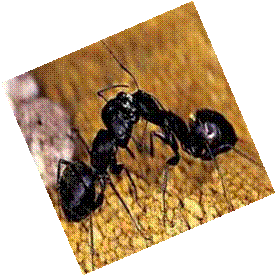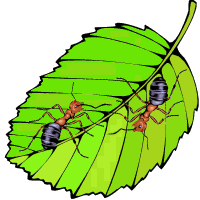



|
PEST KNOWLEDGE PART 2 |
|
Here are some interesting facts and questions we have gathered from our clients. See how much you really know. |
|
|

|
GLOMAC & MACGLO (qc) PEST CONTROL services |
|
“WE ARE THE BEST NOTHING LESS” |


|
Ant facts Most ants live in anthills that are made of mounds of soil, sand and sticks, but some nest in trees.
Ant hills consist of different chambers and tunnels. Each chamber is used for different purposes, such as food storage, nurseries or resting areas.
Ants communicate with the help of their feelers (antennae). They also leave scent trails behind them to let the other ants know exactly where to find the food source.
Not all ants live in anthills. Army ants are nomadic insects. They carry their eggs and young ones along with them while travelling and set up temporary camps. ^ The largest ant in the colony is the queen ant. When she matures, the queen ant flies off in search of a suitable place to build a new colony.
Queen ants nip off their wings once they find a place to breed. Smaller worker ants also have wings.
Worker ants take good care of the eggs. At night, they carry the eggs into deep nest tunnels to protect them from the cold. In the morning, workers carry the eggs back to the surface to warm them.
Male ants die shortly after mating with the queen ant, males become food after dying, so no wastage.
Ants have two stomachs. One stomach carries its own food while the other carries food that will be shared with other ants. This is called the crop. . Each ant colony has a unique smell that helps the members to identify each other. This also helps the ants to detect an intruder in the nest.
Ant nests that are built above the ground are in the form of mounds of soil, twigs and leaves. Some ant mounds can be as tall as one meter. These ant nests are many meters wide.
Different species of ant build different kinds of nests. Some nests are simple with only a few chambers and corridors, while other nests are complex and have separate chambers for the queen, the eggs and the young.
Worker ants take care to control the temperature inside the nest anti ensure that there is proper ventilation in the chambers. The walls of these chambers are made smooth with mud and saliva.
Some species of ant grow ‘fungus gardens’ inside their nests. These gardens provide food for the young ants. There are special cells inside the nest used to store food material for the fungus.
Certain ants build nests in trees. These nests are not confined to a single tree. The ants connect the different trees with the help of underground tunnels and corridors.
Leafcutter ants make the largest ant nests. Some leafcutter nests contain millions of worker ants.
Ants sometimes make use of old, empty wasp nests. They also live in tree galls, dead wood, tree stumps, and vacant termite colonies once termites are gone
Ant Nests Ants live in nests that are built by the worker ants. These nests are known as formicariums.
Ant nests are usually built on the ground. These nests can be either underground or above the soil. Some species of ant support their nests by building them against man-made structures, such as telephone poles.
Ants can build large and complex nests. This is due to their social lifestyle and great strength - a single ant may lift an object 20 times its own body weight. |


|
CONTAC US AT THE FOLLOWING #s:
Phone: (045) 409 4182 PLDT Angeles City
ANGELES CITY 0998-850-0328 - GLORIA 0928-524-1945 - MICHAEL 0999-990-1204 0991-433-4231
MARIKINA 09190729892 - PAULINE
PALAWAN - ANDREW
glomac.philippines2007@gmail.com / glomacpest@gmail.com glomac-pest@glomac-pest-control.com
Whatsapp: 09285241945 Viber: 09285241945 Line: 09285241945
Facebook Messenger: being updated
www.glomac-pest-control.com.ph |
